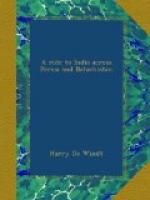Art and industry are, as well as trade, practically at a standstill in the Khan’s city, though a handsome embroidery, peculiar to Kelat, is made by the women, and fetches high prices in India, while some of the natives are clever at brass work and ironmongery. Noticing a Russian samovar in one of the shops, I entered and inquired of the owner (through the Wazir) how it had reached Kelat. “From Russia,” was the reply, “via Meshed, Herat, and Kandahar. There is a good caravan-road the whole way,” added the Baluchi, taking down a small brass shield from a peg in the wall. “This came from Bokhara, via Cabul, only ten days, ago; but trade is not what it was.” “Would there be any difficulty in making that journey?” I asked. “For you—an Englishman—yes,” said the man, with a queer smile, and was continuing, when “The Khan will be growing impatient,” broke in the Wazir, taking my hand and leading me hurriedly into the street.
An Afghan guard of honour was drawn up at the entrance of the palace, wearing the nearest approach to a uniform I had yet seen—dark-green tunics, light-blue trousers, and white turbans, clean, well fitting, and evidently kept for state occasions. Each man carried a Berdan rifle and cavalry sabre. It struck me as a curious coincidence that the former rifle is in general use throughout the Russian army. Leaving my escort with strict injunctions to keep their tempers, and under no circumstances to allow themselves to be drawn into a quarrel, I followed the Wazir and his attendants into the Mir. The entrance is through an underground passage about forty yards long by seven wide, ill-smelling and in total darkness. Arrived at the end, we again emerged into daylight, and, ascending a flight of rickety wooden steps, found ourselves in the durbar-room—a spacious apartment, its walls decorated with green, gold, and crimson panels, alternating with large looking-glasses. Costly rugs and carpets from Persia and Bokhara strewed the grimy floor of the chamber, which is about sixty feet long, and commands a splendid view of the city and fertile plains beyond. Awaiting me upon the balcony was the Khan, surrounded by his suite and another guard of Afghans. A couple of dilapidated cane-bottomed chairs were then brought and set one on each side of the crimson velvet divan occupied by his Highness. Having made my bow, which was acknowledged by a curt nod, I was conducted to the seat on the right hand of the Khan by Azim Khan, his son, who seated himself upon his father’s left hand The Wazir, suite, soldiers, and attendants then squatted round us in a semicircle, and the interview commenced.
A long silence followed, broken only by the whish of the fly-brush as a white-clad Baluchi whisked it lazily to and fro over the Khan’s head. The balcony on which we were received is poised at a dizzy height over the beehive-looking dwellings and narrow, tortuous streets of the brown city, which to-day were bathed in sunshine. The Khan’s residence is well chosen. The pestilent stenches of his capital cannot ascend to this height, only the sweet scent of hay and clover-fields, and the distant murmur of a large population, while a glorious panorama of emerald-green plain stretches away to a rocky, picturesque range of hills on the horizon.




